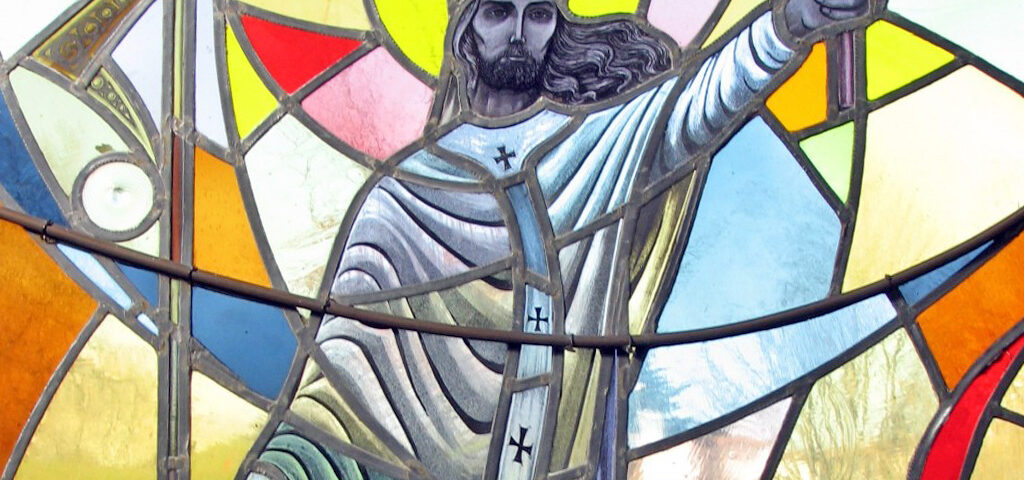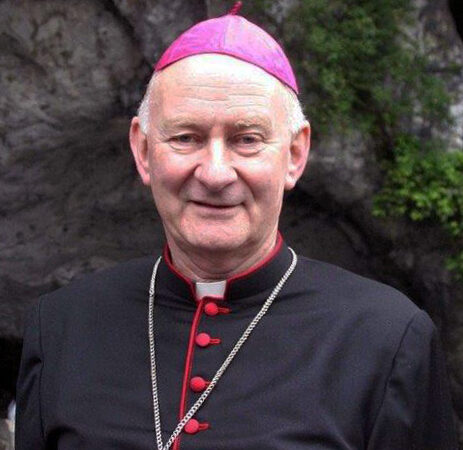“Called to Meet our Fear”
Homily of Archbishop Dermot Farrell
St Patrick’s Church, Corduff, Blanchardstown
January 21, 2024 – 3rd Sunday of Ordinary Time and the Sunday of the Word of God
“Now the word of the Lord was addressed to Jonah, “Up!” he said, “and go to Nineveh, the great city…”
Since 2020, this Sunday—the Third Sunday in Ordinary Time—has been designated as the Sunday of the Word of God—a day envisaged as “given over entirely to the Word of God, so as to appreciate the inexhaustible riches contained in that constant dialogue between the Lord and his people” (Pope Francis, Misericordia et Misera, 7). In a spirit of humility, and with simplicity and openness, let us turn to the Scriptures that the Church puts before us this day, and ask where they now call us, and in what direction they might point our lives.
The First Reading puts before us a scene from the Book of Jonah. We all know about Jonah being in the belly of the “whale” for three days, but we mightn’t be so familiar with all the twists and turns of the Jonah story.
The Ninevites are the sworn enemies of the Israelites. God, who is Lord of all and Father of all, wants to bring them back to himself, and in his compassion and mercy, offers them a way back, and so sends Jonah to make this offer. But Jonah will have none of it! For Jonah, the Ninevites who had conquered the Israelites, are beyond God’s mercy. They are the enemy, and the enemy is outside of God‘s plan, and beyond God’s kindness and faithfulness. For Jonah, “my enemy should be God’s enemy!” But God does not see things that way! God does not look upon His creation in that way. Deep down, Jonah knows this, and that is why he runs away from God.
But God refuses to let Jonah off the hook! If Jonah runs away from God, God goes after Jonah. It is not that God could not find another prophet. No, God wants Jonah! And here we learn something very important about our vocation: what our call asks of us, and makes of us, is as important as what our call asks us to do. So God sends the storm, and Jonah is thrown into the sea. Fortuitously, a big fish—often pictured as a whale—swallows the miserable little prophet—and delivers him back to where he came from, and that’s where today’s reading picks up the story.
Jonah begrudgingly preaches, and, of course, to his annoyance, everything goes according to God’s plan: the people of Nineveh repent, and God forgoes his threat of punishment against them. Jonah is furious—furious at the Ninevites’ repentance, and furious at God’s mercy. “Angry enough to die,” as he later tells God. (4:9)
What is the matter with Jonah? Jonah’s problem is that the God who calls him to be a prophet, is too generous a God for Jonah. Maybe one could say that the living God is too soft for Jonah, too forgiving, too welcoming.
Jonah lives in a rigid world, a world of clarity, where everybody has their place, and where everybody knows their place, where everybody knows who’s in and who’s out. That is the world where Jonah is at home. That is the world where Jonah is safe. Not the “wishy-washy” world of God.
Jonah’s search for safety and security leads him, in the words of one scholar, “to close off the threatening outside world, with its peoples, friend and foe alike, and its multiplicity of creatures all of which demand his attention and concern.”
However, the living God, the Father of Abraham, the Father of Jesus, and the God to whom we pray, whom we call “Our Father,” would have him meet the outsider, the other, the stranger. The safety and ‘security’ that Jonah seeks are an illusion. They are a myth. Not the real world, they offer no solution to the challenges of living.
Jonah’s self-made world is mirrored in the enthusiasm of Jesus’ first disciples in today’s Gospel story! They follow Jesus “at once.” In their enthusiasm, they go after Christ, but follow their own agenda. They are on the same road but not on the same journey! They’re about themselves: James and John want to be first and second when Jesus comes into his kingdom. The disciples, are constantly annoyed by the crowds surrounding Jesus. In the end, those who so quickly left their nets would equally rapidly abandon Jesus, in his hour of need, in his passion and death.
Just like Jonah with God, the disciples are also overwhelmed by the reality that Jesus puts before them, and with the way he asks them to engage. Something similar is happening for us in the present time. In the last two years, this country and others have welcomed, vast numbers of people fleeing the cynical war in Ukraine, and other conflicts in so many troubled regions of the world. We are faced with responding to those who have come to seek sanctuary or build a new life among us. This is a challenge. It is a challenge which arises in the context of long-standing shortcomings in the provision of housing and other services for a growing population.
It is precisely in this context, in this concrete situation that God addresses his word to us. We are called today no less than Jonah, or the first disciples—to embrace the way of God.
These are inspiring words, but what do they mean? To what are we called? In the first instance, it is to recognise our common humanity with the refugees and asylum seekers who have arrived in our midst. They are entitled to make their case within the framework that society has created to regulate admission to the country. While doing so, they are not to be targeted or penalised, abused or frightened. As followers of Christ, we are called to speak up for their rights and dignity. We are called to speak up when individuals are targeted, victimised or stigmatised, or used as pawns in disputes which are really about politics and resources.
We are called to speak up for the truth about migration and population change, not to deny that it is a serious challenge, but to rebut the misinformation that is spread to stir up suspicion and hatred.
The heart of our faith is compassion. Remember the Samaritan! (Luke 10:25–37) We are called to solidarity with our least fortunate brothers and sisters, to use our creativity, energy and resources to make life better. But we are also called to solidarity with those who are asked to accept into their community those who need shelter. It is right that the practical consequences for communities be recognised and addressed. Parish communities have been to the fore in this regard, but it is also a matter for the public authorities: we are all called to play our part, so society as a whole must give practical support to host communities in proportion to the scale of the responsibility they are asked to assume.
Our world is changing, and we find ourselves in a new era of migration. It challenges us in all the dimensions of our life together as a community. History will judge how we respond. God’s word brings home to us that we are all brothers and sisters. Our God-given gifts will help us put into practice what this means. The call is urgent.
There was a naivety about the disciples in their initial enthusiastic response to Jesus. That said, they are true disciples as they do follow him, and eventually, by his faithfulness to them, His word, his life makes a home in them, and eventually they follow him to the cross, to their own crosses.
Truth be told, almost all disciples are initially naïve: we all fail to appreciate our own weakness. Does the same not hold for marriage? And yet we begin, we have to begin. If we don’t, we go nowhere.
My friends, my sisters and brothers, on the long road of discipleship, it is where the journey goes that is important. Let us entrust ourselves to the Lord’s living word: “anyone who wants to be a disciple of mine …” (Mark 8:34) Let us entrust ourselves to his faithfulness to the little ones, to people in their weakness. Let us take a step on the road after him …. “if anyone wants to be first of all, they must be last of all and servant of all.” (Mark 9:35), “Whoever welcomes one such child in my name welcomes me, and whoever welcomes me welcomes, not me, but the one who sent me.” (Mark 9:37). That child is at our door—the stranger in our communities. Can we take Christ at his word? Can we welcome him? Or, will we be like Jonah, led by fear, and turn away?







